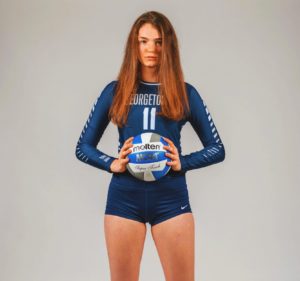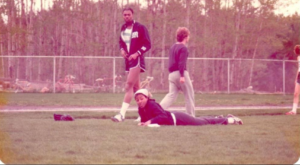
Taylor Treacy
Wrote this article for you. Click the icon to view her awesomeness.
“As much as some people want to say or believe that athletics aren’t political, they are. Systemic racism lives in our society and athletics is a part of that society.“
There is no ignoring the racial unrest in America these days.
For 400 years, Black Americans have been burdened with unethical enslavement, fixed systems, and deep-rooted prejudice in a nation whose slogan is “The Land Of The Free, And The Home Of The Brave.”
There is nothing “free” or “brave” about America’s slow reaction to respond to the cries of its underrepresented populations.
Black athletes aren’t immune to the greater racial issues that generations of Americans have had to withstand.
The lack of diversity among NCAA and professional level coaches, administrators, athletic trainers, and team owners isn’t shocking given America’s history of racial inequity.
Athletes everywhere are jumping on the opportunity to speak up right now, and with good reason.
Enter, Taylor Leath.
Taylor Leath played Division I volleyball for Penn State University and UNC-Chapel Hill, from 2014-2018.
Leath is a badass.
Most athletes only dream to receive the accolades and recognition she’s accumulated over her athletic career.
Today, she wants to share her perspective on the racial disparities that exist within our sports communities, and what her college athletic experience was like.
More on Taylor Leath:
- » UNC’s Student-Athlete Advisory Counsel (SAAC) Vice President (2016)
- » PrepVolleyball Preseason Player of the Year Candidate (Top 12)
- » FloVolleyball Preseason National Player of the Year Candidate (Top 10)
- » espnW 12 Players Set for Stardom
- » AVCA All-America Second Team (2016)
- » ACC Player of the Year (2016)
- » AVCA All-East Coast Region
- » All-ACC First Team
- » ACC Player of the Week
- » FloVolleyball NCAA Player of the Week
- » Sports Imports/AVCA Division I Player of the Week
- » espnW Volleyball Player of the Week
- » Multiple All-ACC Academic Team Awards
Taylor is currently a Master’s Candidate at Penn State University’s Bellosario College Of Communications.
She is black. She is very smart. She’s an amazing sportswoman and contributor to The Virago Project. And she’s one of my best friends.
Thanks for your time, Taylor.
Question 1: Where does racial disparity exist in sport?
In short, it’s everywhere.
It’s a lack of diversity in coaching staffs, training rooms, administrators, and team ownership. It’s a lack of diversity in the NCAA. It’s unequal access to resources. It’s in the rules and regulations. The list goes on and on.
Sports are a manifestation of what is going on in the world around us. As much as some people want to say or believe that athletics aren’t political, they are. Systemic racism lives in our society and athletics is a part of that society.
Question 2: Is there such a thing as “White” and “Black” sports in America?
Yes and no. Are there sports that are inherently one race or the other? No.
With that being said, there are a number of different ways that sports have been constructed as “White” or “Black”.
For example, economic barriers to entry. “White” sports are primarily associated with affluent country club sports (I.e. golf, lacrosse, field hockey, volleyball, etc.) that need more resources and equipment. “Black” sports (I.e. football, basketball, track, etc.) are those that require lower barriers to entry and need fewer resources and equipment.
In that example we can see how there aren’t really even “Black Sports”, but there are sports that seem “Black” because Black people are more economically disadvantaged in the United States via systemic and institutionalized racism.
Question 3: What are the implications of being a non-white athlete who plays a seemingly “White” sport.
I can’t speak for everyone, but in my experience, the most scathing implication is that there aren’t many Black people.
When you play a predominantly white sport you experience things alone. You’re commodified to the point that some people want you on their team because you’re Black, but on the other hand, you’re ostracized to make you feel like you don’t belong.
I know of girls that have been pushed out of the sport they love for those reasons.
Question 4: How does race affect the locker room?
On the day-to-day, it’s benign things like the one-off questions about your hair or your music choices.
In times like these though (June 2020), where we are literally fighting for our right to live and be treated as human beings, it’s jarring when some of the same girls you’ve cried with, sweat with, gave your all with, basically went to battle with – fail to show up for the battle in real life.
Question 5: How does it affect team cohesiveness and social gatherings?
Off the court, I had to navigate spending time with my team to create memories in settings that I simply didn’t enjoy or made me feel uncomfortable.
Sometimes I wanted to go to places or events where I, as a Black woman, was celebrated – not just tolerated, and certainly not discriminated against.
Sadly that meant “the Black girl/s” were frequently leaving the group.
Question 6: Can race cause a divide on teams?
It can.
Going back to the last question, consistently leaving certain situations (and social gatherings) can create the perception that you don’t want to be around your teammates, but that’s not always the case.
Navigating respectability politics as a Black athlete can be exhausting, sometimes I just wanted a break.
Question 7: Should race be a concern for young female athletes when they are making the decision to commit to a college or university?
It should be something that’s on their radar.
It was very important to me when I chose my program. The degree of importance may differ based on the individual athlete, but it should be on the list.
Being an athlete doesn’t make you immune to racism. It’s important to know you’re in a place that values and empowers you.
Question 8: How did race affect you as a recruit?
Simply put, I wanted to go somewhere that I saw people that looked like me making an impact.
I felt comfortable with the programs I chose, and whether or not I knew it at the time, I think diversity played a part in that.



